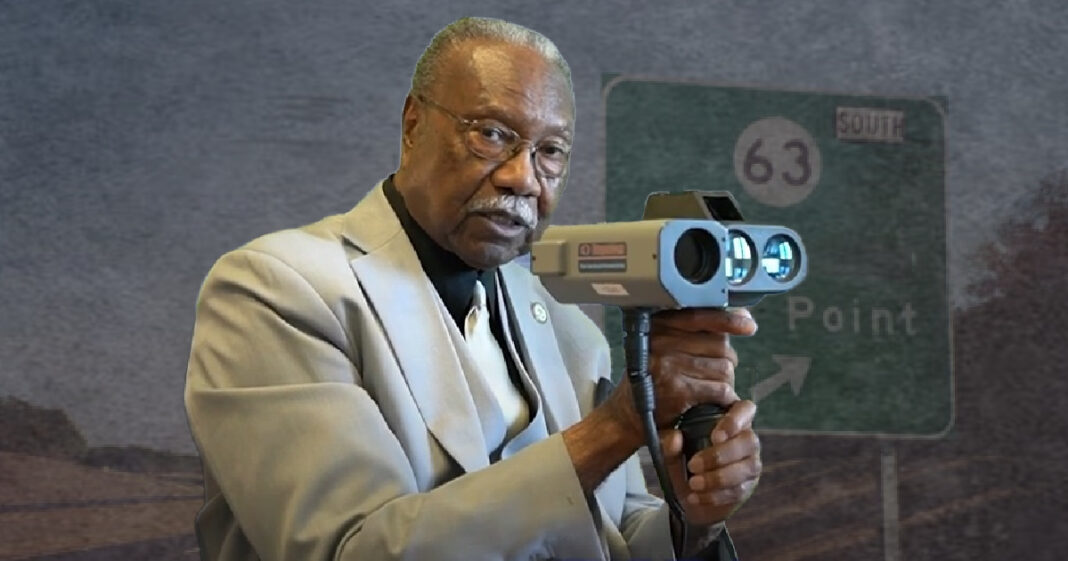MOSS POINT, MS — Moss Point’s introduction of hand-held radar cameras has ignited legal action and community backlash, as questions arise about the system’s legality under Mississippi law. City officials defend the technology as crucial for public safety, but many believe it may violate the state’s ban on automated enforcement.
Moss Point Police Chief Brandon Ashley explained the radar cameras’ function in a July interview, stating, “It takes a picture of the driver and also as you’re going by it takes a picture of the tag. It gets uploaded in a database. No traffic stop. There’s no contact, nothing like that, so it’s more efficient and it’s more safe for everyone involved.” Ashley emphasized that the system would increase enforcement productivity by allowing officers to write more tickets without physical traffic stops.
Mayor Billy Knight, Sr. has also defended the program, telling WLOX, “We are taking extra steps and giving our police officers better resources to address the problem of speeding. This new initiative will increase public safety for our citizens, visitors, and the entire community.”
Some residents, like Leslie Welford, claim they received tickets for roads they never traveled. “My husband got a ticket on a road he’s never even been down,” Welford shared on Facebook.
Other residents, like former police officer Arlene Starley, expressed concerns that the system is more about revenue than safety. “If an officer catches you speeding, they should pull you over, not send you a ticket in the mail! This feels like a scam to make more money,” Starley posted on the Facebook group Moss Point Talk of the Town.
Legal Action Filed
On July 30, a lawsuit was filed by attorney David Futch on behalf of named residents from Moss Point, Biloxi, Pascagoula, and Lucedale, as well as “all similarly situated plaintiffs known and unknown” who received speeding tickets via the new radar system. The lawsuit argues that the system violates Mississippi Code Section 17-25-19, which bans automated recording systems for enforcing traffic laws. Plaintiffs include several individuals who claim they were not speeding or were not even present in the area when the alleged violations occurred.
In the lawsuit, Futch argues that Moss Point’s radar system violates Mississippi law and asks the court to halt the program. “I filed an injunction for the court to rule strictly on the legality of the devices with the law,” Futch states in the pleadings. “They’re looking at what it doesn’t say and using that for their advantage,” reflecting his belief that the city is attempting to exploit a perceived loophole.
“Here we have a state law prohibiting the use of these recording devices and the City of Moss Point is saying that it is legal so long as it is not on a pole!”
Futch is asking the court to bar Moss Point from using the radar camera system. Additionally, he is requesting that all collected fines be refunded and that all citations issued be voided.
Moss Point’s Defense: It’s Not Automated
In response, the City of Moss Point, represented by Amy St. Pé, filed a motion to dismiss on August 20. The city argues that their radar camera system is manually operated by officers and, therefore, not subject to the automated enforcement ban under Section 17-25-19. According to the motion, the system is only engaged when an officer manually activates the radar and video camera. The collected data is then reviewed by the officer, who uses their discretion to issue a citation. The motion emphasizes, “There is nothing automated about this system. A Moss Point officer must manually engage the radar and video, and then review the footage to decide whether a ticket should be issued.”
Loophole or Legal Risk?
Moss Point officials argue that their system is legal because the cameras are hand-held by officers, not mounted. However, critics assert that this may be an attempt to exploit a loophole that doesn’t exist. Mississippi law prohibits any automated system that records violations and issues penalties, regardless of whether the device is stationary or operated by an officer. Legal experts suggest that the system’s automation of ticketing may still violate Section 17-25-19, creating a legal gray area that could land the city in hot water.
Similar Challenges in Nearby Cities
Moss Point isn’t the first Gulf Coast city to face challenges over automated traffic enforcement. Ocean Springs previously implemented an Automated License Plate Recognition (ALPR) system to identify uninsured motorists. The system scanned license plates and cross-referenced them with a state insurance database. Like Moss Point’s radar cameras, citations were issued by mail. However, Ocean Springs ceased using the system after a series of complaints, arguing the system violated Mississippi’s ban on automated enforcement, as well as some insured drivers claiming they were erroneously cited.
Potential Problems for Moss Point Taxpayers
If the court challenge results in rulings against Moss Point, the city could face significant financial consequences. Taxpayers may be on the hook for legal fees, refunds for tickets already issued, and potential settlements with plaintiffs. Moreover, discontinuing the program could result in additional administrative costs. These financial burdens could ultimately lead to higher taxes or budget cuts in other areas. Moss Point’s attempt to find a loophole in the law may not only impact its legal standing but also place an unexpected strain on local taxpayers.
The future of the radar camera program hangs in the balance as the court considers whether the system violates state law.
RESOURCES:
Mississippi Code 1972 § 17-25-19 (2023)
Title 17 – LOCAL GOVERNMENT; PROVISIONS COMMON TO COUNTIES AND MUNICIPALITIES (§§ 17-1-1 — 17-29-9) Chapter 25 – GENERAL PROVISIONS RELATING TO COUNTIES AND MUNICIPALITIES (§§ 17-25-1 — 17-25-39) Section 17-25-19 – Prohibition against ordinance authorizing use of automated recording equipment to enforce compliance with or impose penalties for violation of traffic laws
- (1)
- (a) Neither the board of supervisors of any county nor the governing authority of any municipality shall adopt, enact or enforce any ordinance authorizing the use of automated recording equipment or system to enforce compliance with traffic signals, traffic speeds or other traffic laws, rules or regulations on any public street, road or highway within this state or to impose or collect any civil or criminal fine, fee or penalty for any such violation.
- (b) Any county or municipality using automated recording equipment or system shall remove the equipment or system before October 1, 2009.
- (2) For the purposes of this section, the term “automated recording equipment or system” means a camera or optical device installed to work in conjunction with a traffic control signal or radar speed detection equipment or both and designed to record images that depict the license plate attached to the rear of a motor vehicle that is not operated in compliance with instructions of the traffic control signal or the posted speed limit.
The River City Chat w/Mayor Billy Knight Sr.: Police Chief Ashley on New Radar Guns


